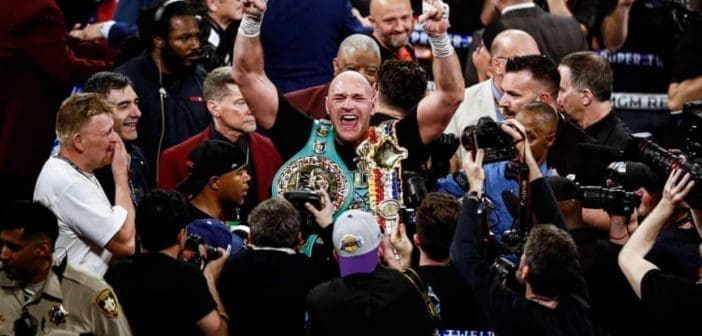Have we not learnt? Have we forgotten about 2019 and Andy Ruiz?
The short stubby Mexican-American was the one who got the job done. The one who completed the job and in doing so, shook up the boxing world. Yet, in all of the madness that descended on Broadway New York on June 1, Ruiz wasn’t the first to cause a seismic shock or become the only outlier.
Heavyweight boxing is littered with upsets and shocks from unknown quantities and one fight wonders. Tyson-Douglas always being referred to as the notable example. But as we sit entrenched in this new golden era for the division, few underdogs have been able to pull off the improbable, apart from Ruiz.
So many came so close. In case you forgot, Otto Wallin was a doctor’s call away from beating Tyson Fury last September. That’s right, the main man, the irrational genius, Tyson Fury could and arguably should have, lost. Who knows, on a different day, a different doctor, that cut would have simply been too gory to carry on.
Yet saying that, Wallin was not the lone instance. In 2013, Cruiserweight-turned-heavyweight Steve Cunningham poleaxed Fury, and was just one further punch away from knocking him out. That’s right, the Gypsy god of boxing, Tyson Fury. Nevin Pikaj, the Bosnian heavyweight no one had or has heard of since, also sent Fury crashing to the canvas.

Cunningham knocked Fury down in the second round of their bout – Photo: Peter Cziborra/Action Image
Yet, the only reason why these three men pale into insignificance, especially with the casual boxing audience, is they simply did not win. Andy Ruiz did.
It’s ingrained within modern society for immediate answers. We want everything now and fast. The old adage ‘you’re only as good as your last fight’ had never rung truer than in the aftermath of Fury-Deontay Wilder 2.
All it took was seven mere rounds for public perception to change altogether. It sparked a swell of voices, all insisting Tyson Fury is the resounding heavyweight, in the process putting to bed years of debate regarding the fiercest, most talked-about topic in the sport. Fury was the answer. There would be no buts, no maybes – he was. If you had an alternative opinion, you had committed a crime. Fury’s manner of victory – undoubtedly sublime – offered the catharsis so many boxing fans craved.
It was as if some form of boxing paradox had been contrived, where some who were now entranced with February 23, were previously banking on Wilder’s right hand to bail him out of trouble prior to the fight. They widely accepted Wilder had the power to knock Fury out, to go and finish the job after almost decapitating Fury in the 12th round of the first bout.
But as society does, we are always wise after the event, always seeing certain events or moments in life differently in hind-sight. Almost a month on and most fans believe there are no cases for Deontay Wilder – or any other heavyweight for the matter – to beat the Briton. In their eyes, its pretty cut and dry; Tyson Fury is the greatest boxing giant of our era. No other man, no other humanistic creature can beat him.
And that reactionary view is somewhat understandable. A performance so conclusive, it resembled a pride of lions ripping the flesh of its prey. Running straight across the ring at the sound of the first bell, Fury never let up and systematically, yet ruthlessly, broke Wilder down. And as seen in the American’s shocked expression which was lasted for all the seven rounds, not one person watching on expected it.
Fury marched forward, applying constant, masterful pressure and hunted down one of history’s most destructive punchers. It was the classic Kronk style, something the 31-year-old had never done before and no one, apart from the man himself and maybe a handful of team members thought he could ever do. To learn the Kronk style, derived from the late-great trainer Emmanuel Steward in the 70’s, in the space of just six weeks, was extraordinary.
But the thing is, Tyson Fury can be and WILL BE beaten.
Anthony Joshua already has and will again.
Deontay Wilder just has and will again.
In this theatre-like age of heavyweights, every single one of them is vulnerable. That’s what makes it such compelling viewing. Unlike other divisions, its not a death sentence to be a flawed fighter in the heavyweight division. Each fighter can be seriously hurt or have an off night.
And the tendency to be inconsistent certainly applies to Fury. A frequent motif in his 31-fight career is his yo-yo like performance levels, either raising his game to unprecedented heights, or becoming laboured against competitors who possess nowhere near the similar talent as he does.
Tyson Fury is an impulsive, occasionally erratic character. All of which has contributed to his flawed genius. But those personalities traits can have repercussions. If the Wilder win was him at his peak, then his strained victory over Otto Wallin five months prior underlined a severe chasm in levels.
Whisper it quietly, Fury perhaps should already have a loss on his record. The John McDermott fight way back in 2009 was a controversial decision win. And who knows, another referee may have waved off the first Fury-Wilder bout.
When Fury loses, it will simply be a case of heavyweight boxing continuing to work in a cyclical structure. Its history repeating itself, where with the exception of unbeaten Rocky Marciano, every giant eventually does get slayed.
Fury is brilliant. But no heavyweight in this era is indestructible.
![Prost International [PINT]](https://prostinternational.com/wp-content/uploads/2021/08/PINTtFontLogoRoboto1536x78.jpg)



